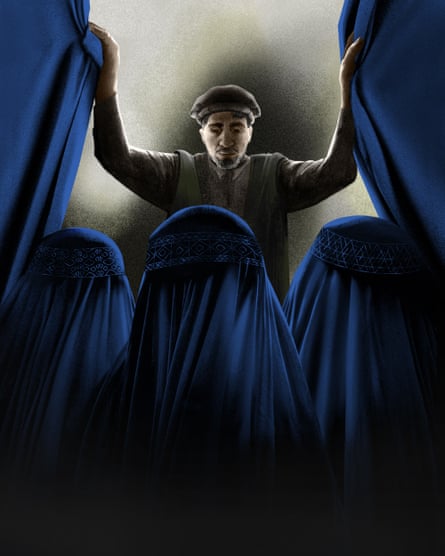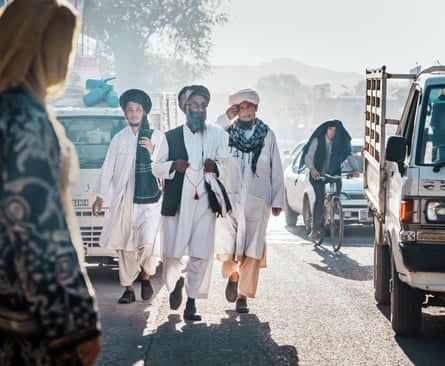Afghan fathers, brothers and husbands are under pressure to ensure the women in their families observe the country’s repressive laws. Here, men and women across the country explain how it is affecting family bonds

To be a father of daughters in the Taliban’s Afghanistan has become a daily nightmare for Amir. Now, he says, he is more prison guard than loving parent, an unwilling and unpaid enforcer of a system of gender apartheid that he despises yet feels compelled to inflict on his two teenage girls in order to protect them from the Taliban’s rage and reprisals.
Just a few years ago, Amir’s daughters had a life and a future. They went to school, to see friends and moved around their community. Now, he says he would prefer it if his daughters never left the house. He, like many other fathers in Afghanistan, has heard stories about what can happen to young women who find themselves in the crosshairs of the Taliban’s “morality police”.
In the rare instances when their begging and pleading to be allowed out in the world gets too much for him, he ensures they go accompanied by a male member of the family and are fully covered.
“I insist that they wear the hijab and I tell them they are not allowed to laugh outside the house or at the market,” he says. “The ‘morality police’ are very strict, and if they don’t comply, they might get detained.”
Last summer, three years after they swept to power in August 2021, the scale of the Taliban’s ambition to erase women from public life was laid bare in their unveiling of an extensive set of “vice and virtue” laws.
Under the new rules, women were told to cover themselves completely when outside the house; not to allow their voices to be heard talking loudly; to only appear in public with a male escort and never to look at a man who was not their direct relation.

When the rules were announced, it was unclear how a relatively small number of “morality police” employed by the Taliban would enforce and implement these rules.
Yet, in the months since the rules were announced, it has been fathers, brothers and husbands who have become, in effect, unpaid foot soldiers imposing the Taliban’s oppressive regime on Afghanistan’s women and girls.
They are driven not just by fear of what will happen to women if apprehended by Taliban enforcers. Under the Taliban’s new rules, if a woman is deemed to be found in breach of its morality rules, it is her male relative, not her, who could be punished and face fines or even prison.
The Guardian and Rukhshana Media spoke to more than a dozen men, as well as young women across Afghanistan, about how the Taliban’s morality laws were changing their attitudes and behaviours towards the women in their families.
“Men have become unpaid soldiers of the Taliban,” says Jawid Hakimi, from Bamyan province. “We are forced, for the sake of our honour, reputation and social standing, to enforce the Taliban’s orders on the women in our families. Day by day, society is adjusting to the Taliban’s rules, and their restrictions [on women] are gradually reshaping society according to their vision – and we feel compelled to align our families with their expectations. It is a suffocating atmosphere.”
Parwiz, a young man from a province in the north-east of Afghanistan says when his sister was detained by the Taliban’s “morality police” for not wearing a hijab, he was terrified for her safety and determined that this would never happen again.

“I was forced to go to the police station, where I was insulted and told I had to do whatever the Taliban said,” he says. “When I came home, I took out all my anger and frustration on my mother and sister.”
Other men who spoke of how the fear of social shame if they were punished for “immoral” behaviour was spilling over into repression and violence towards their female family members.
Freshta, a young woman from Badakhshan province, says she is beaten by her husband if she leaves the house, even to get food at the market. “I went to the corner of the street to buy vegetables and I had put on a long, black hijab but no burqa. When I returned, he hit me across the face and beat me.
He said: ‘Do you want us to break the rules? What if one of my work colleagues saw you?’ For months now I have barely left the house. He says if I do leave I need to wear the burqa.”
Rabia, 22, says he cannot risk the family facing the “dishonour” of his elder sister Maryam going out and people thinking that she is dressed immodestly.
“Our pride doesn’t allow it. We have shame, we have honour. We can’t bear the thought that, God forbid, something might be said about her in the city or the market,” he says.
Young women spoke of the pain of their families turning into enforcers of a morality code imposed on them by an extremist ideology that had already stripped them of their right to education, work and self-autonomy.
“My father’s behaviour changed after the Taliban came. Before that, he didn’t care much about our [his daughters’] clothing,” says 25-year-old Masha. “Before, he never told us not to wear something or to avoid certain places, but as soon as the Taliban came he changed. He said: ‘If you consider me your father and care about the dignity of your family you will wear the hijab. Don’t wear makeup, not even a strand of your hair should be visible, don’t wear high-heeled shoes, and you don’t need to go out so often. Tell me or your brothers so we can get it for you from the market,’” she says.
“So now every time I have my period I have to go without sanitary products or medicine. I just stay inside.”
Richard Bennett, the UN’s special rapporteur on the situation of human rights in Afghanistan says that, while he has documented “acts of resistance” from Afghan men against the Taliban’s institutionalised repression of women, “within families, male family members are increasingly enforcing restrictions on their female relatives, and more women report needing permission to leave their homes. There are also increasing reports of female family members ensuring compliance.”
“The presence of de facto officials and suspected informers in communities, the threat of constant surveillance and the unpredictability of enforcement are further contributing to feelings of insecurity, heightening psychological stress and anxiety, especially among young women,” he says.

 3 months ago
71
3 months ago
71

















































